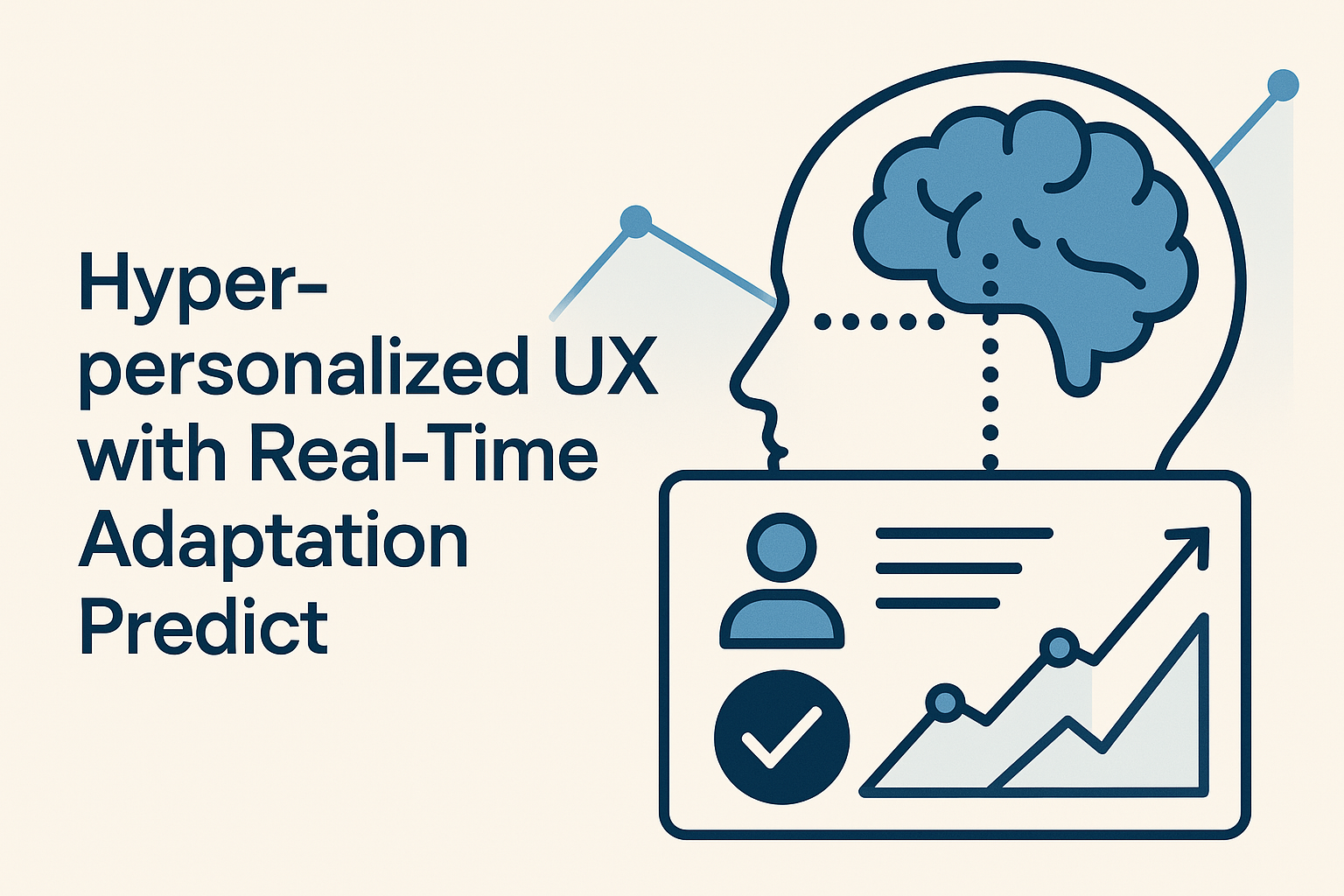Hyper-personalized UX with Real-Time Adaptation aiming for Predictive & Adaptive Design
How Hyper-Personalized UX with Real-Time Adaptation is Changing Everything
Imagine a digital experience that instantly changes based on what you do, where you are, and what you want — before you even know it.
That’s what hyper-personalized UX with real-time adaptation is all about.
And it's transforming how users interact with apps, websites, and software forever.
Key Takeaways
-
Hyper-personalized UX means adapting content and layout to each user instantly
-
It uses AI, machine learning, and behavioral tracking to make decisions on the fly
-
Real-time adaptation improves engagement, retention, and conversions
-
Companies like Amazon, Spotify, and Netflix are already doing it — and winning
-
You don’t need to be a tech giant to implement it
-
Tools and services like Innovaway are making this easier for all businesses
What is Hyper-Personalized UX with Real-Time Adaptation?
Let’s break this down like you’re 5:
-
Hyper-personalized UX = An app or site changes for you specifically
-
Real-time adaptation = It changes the moment you do something
So instead of showing every user the same boring interface, the design and content shift based on your behavior.
Like when Netflix switches thumbnails based on what you’ve watched. Or when Amazon shows different product pages to different users.
It’s next-level personalization — happening right as you click, scroll, or pause.
And unlike basic personalization (like “Hi Sarah”), this dives deep into your behavior, intent, and context.
Why Real-Time UX Personalization Matters
Old-school UX is static.
Every user gets the same layout, flow, and content — no matter what.
But users today expect magic.
They want apps that know them.
That react instantly.
That feel like they were designed just for them.
Here’s why it matters:
-
Attention spans are short (you’ve probably already skimmed this far 🤯)
-
People abandon sites in seconds if it feels irrelevant
-
Real-time UX keeps them engaged, interested, and coming back
According to the Nielsen Norman Group, predictive and adaptive interfaces will dominate the future of UX.
It’s not just a trend.
It’s a necessity.

How Hyper-Personalized UX Works
This isn’t magic (but it kinda feels like it).
Here’s what’s happening behind the scenes:
-
User Data Is Collected Instantly
-
Clicks, scrolls, pauses, time on page
-
Device type, location, time of day
-
-
AI + Machine Learning Analyze Behavior
-
What does this user want right now?
-
What’s their goal?
-
-
Frontend UI Changes Automatically
-
Show different layouts
-
Prioritize different CTAs
-
Adjust navigation paths
-
-
Feedback Loops Improve Over Time
-
The more users interact, the smarter the system gets
-
Here’s a visual:
| Step | Action | Result |
|---|---|---|
| User clicks on a product | AI records interest | Related products shown |
| User scrolls past feature section | Feature is hidden next time | Cleaner interface |
| User hesitates on pricing | Chatbot pops up with FAQ | Higher conversion |
This is where companies like Innovaway shine.
They build intelligent, adaptive SaaS systems that personalize user journeys in real time — so your business always feels one step ahead.
Real-Time UX Use Cases Across Industries
Every industry can benefit from this.
Let’s go industry by industry:
🔸 eCommerce
-
Personalized product recommendations
-
Dynamic pricing based on demand or user behavior
-
Real-time cart updates and upsells
🔸 Healthcare
-
Patient dashboards that adjust to symptoms or progress
-
AI-guided symptom checkers
-
Adaptive appointment flows
🔸 Finance
-
Transaction alerts personalized to spending patterns
-
Fraud alerts that adapt based on risk signals
-
Real-time investment suggestions
🔸 EdTech
-
Adaptive learning paths
-
Personalized quizzes and study tips
-
Instant content reshaping based on student performance
🔸 SaaS & Digital Experience Platforms
-
Smarter onboarding flows
-
Feature prioritization based on role
-
Contextual tooltips and walkthroughs
And again — this is exactly where Innovaway comes in.
They design and implement personalized experiences that adapt in real time — all backed by enterprise-grade SaaS solutions.
Benefits of Real-Time Hyper-Personalized UX
You’re not doing this just to be fancy.
There are real, measurable benefits:
-
Higher conversion rates
-
Better engagement
-
Smarter onboarding
-
Relevant content in every click
-
Trust-building interactions
Let’s say you sell software.
A new user logs in → sees features just for their industry → gets value in minutes instead of hours.
Boom. Retention just went up.
Challenges of Implementing Hyper-Personalized UX
Now let’s keep it real — it’s not always easy.
Here are the biggest hurdles:
! Privacy Concerns
-
GDPR and CCPA are strict
-
You need explicit consent before collecting data
! Performance Issues
-
Real-time means fast.
-
You can’t afford lag.
! Implementation Costs
-
Advanced AI and ML setups aren't free
-
But tools like Firebase and Optimizely can help
! Algorithm Bias
-
Personalization gone wrong feels creepy
-
You need oversight and testing
! Human-Centric Design
-
Don’t forget the user
-
Not everything should be automated
That’s why working with experts like Innovaway can help you avoid the traps while delivering amazing UX.
Lets get in touch
